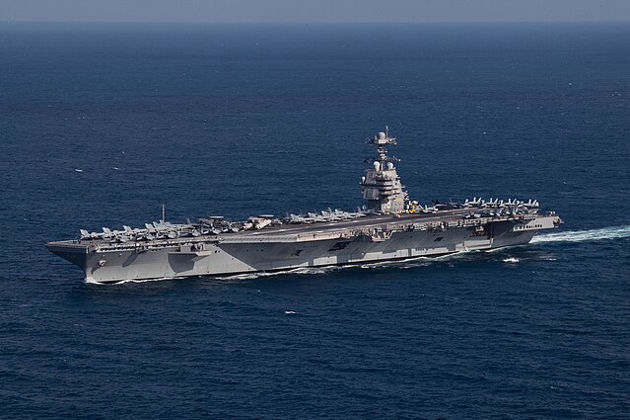Move FM Global News

US deploys Gerald R. Ford carrier to Caribbean amid Venezuela tensions
Oct 28, 2025WASHINGTON, D.C.: President Donald Trump’s administration stepped up the U.S. military presence in the Caribbean this week by announcing the deployment of the USS Gerald R. Ford aircraft carrier group to Latin America.
The move is seen as a significant show of force — much larger than any past U.S. anti-drug operation — and marks Washington’s most aggressive action in the region so far.
The carrier group joins eight warships, a nuclear submarine, and F-35 fighter jets already in the area, increasing tensions with Venezuela, whose government the U.S. has long accused of protecting drug traffickers and undermining democracy.
Pentagon spokesperson Sean Parnell said on X that the increased U.S. presence would strengthen the country’s ability to “detect, monitor, and disrupt” criminal activity that threatens American security. He did not say when the carrier would arrive, but noted that it was recently sailing through the Strait of Gibraltar in Europe.
The Gerald Ford, commissioned in 2017, is the U.S. Navy’s newest and largest aircraft carrier. It has over 5,000 sailors and space for more than 75 aircraft, including fighter jets and early-warning planes. It is equipped with advanced radar systems and powerful missiles.
Since early September, the U.S. military has launched 10 strikes against suspected drug boats in the Caribbean, killing around 40 people. The Pentagon has confirmed that some of those killed were Venezuelan.
Venezuelan President Nicolás Maduro has accused the U.S. of trying to remove him from power. On Thursday, he warned that if the U.S. intervened militarily, Venezuelans would “rise” in a massive armed resistance.
In August, Washington doubled its reward for information leading to Maduro’s arrest to $50 million, accusing him of drug trafficking — charges he denies.
Relations have also worsened between the U.S. and Colombia, Venezuela’s neighbor. Trump recently called Colombian President Gustavo Petro a “drug leader” and a “bad guy,” remarks that angered Bogotá.
Pentagon spokesperson Parnell said the new forces would help stop drug smuggling and weaken transnational criminal groups. The Trump administration has also authorized the CIA to conduct secret operations in Venezuela and announced sanctions against Petro shortly after revealing the carrier deployment.
Trump told reporters that the U.S. would soon brief Congress on its anti-cartel operations and that future actions could include ground missions.
Defense Secretary Pete Hegseth said a U.S. strike in the Caribbean had just killed six suspected “narco-terrorists.”
While some Democrats and legal experts have raised concerns about whether these strikes follow international law, Republican lawmakers praised the move. Representative Rick Crawford said Trump was serious about “protecting the U.S. and our Western Hemisphere neighborhood.”
With only 11 aircraft carriers in total, the U.S. rarely sends one to Latin America. The last time was last year, when the USS George Washington visited South America for a planned military exercise.


